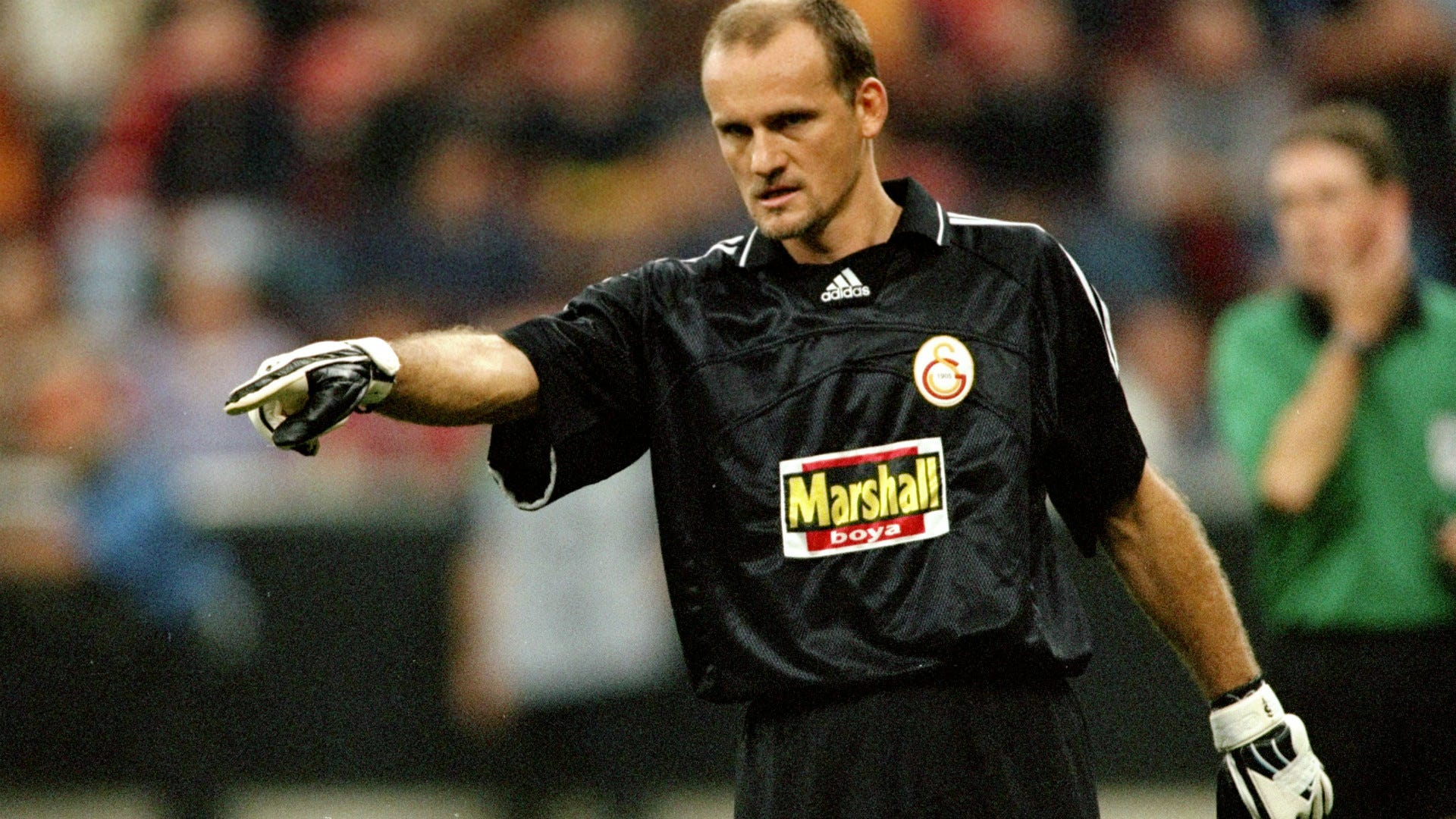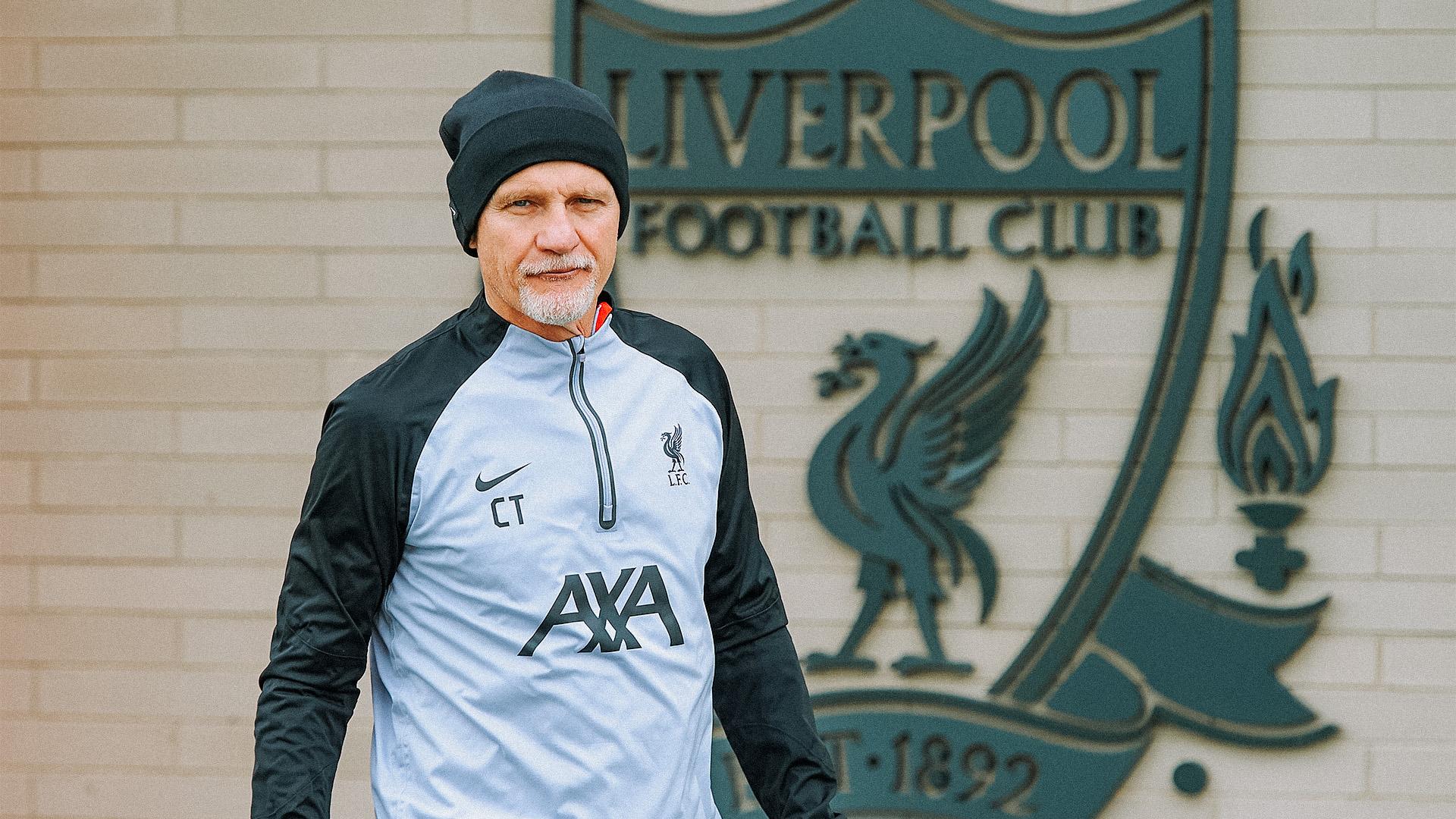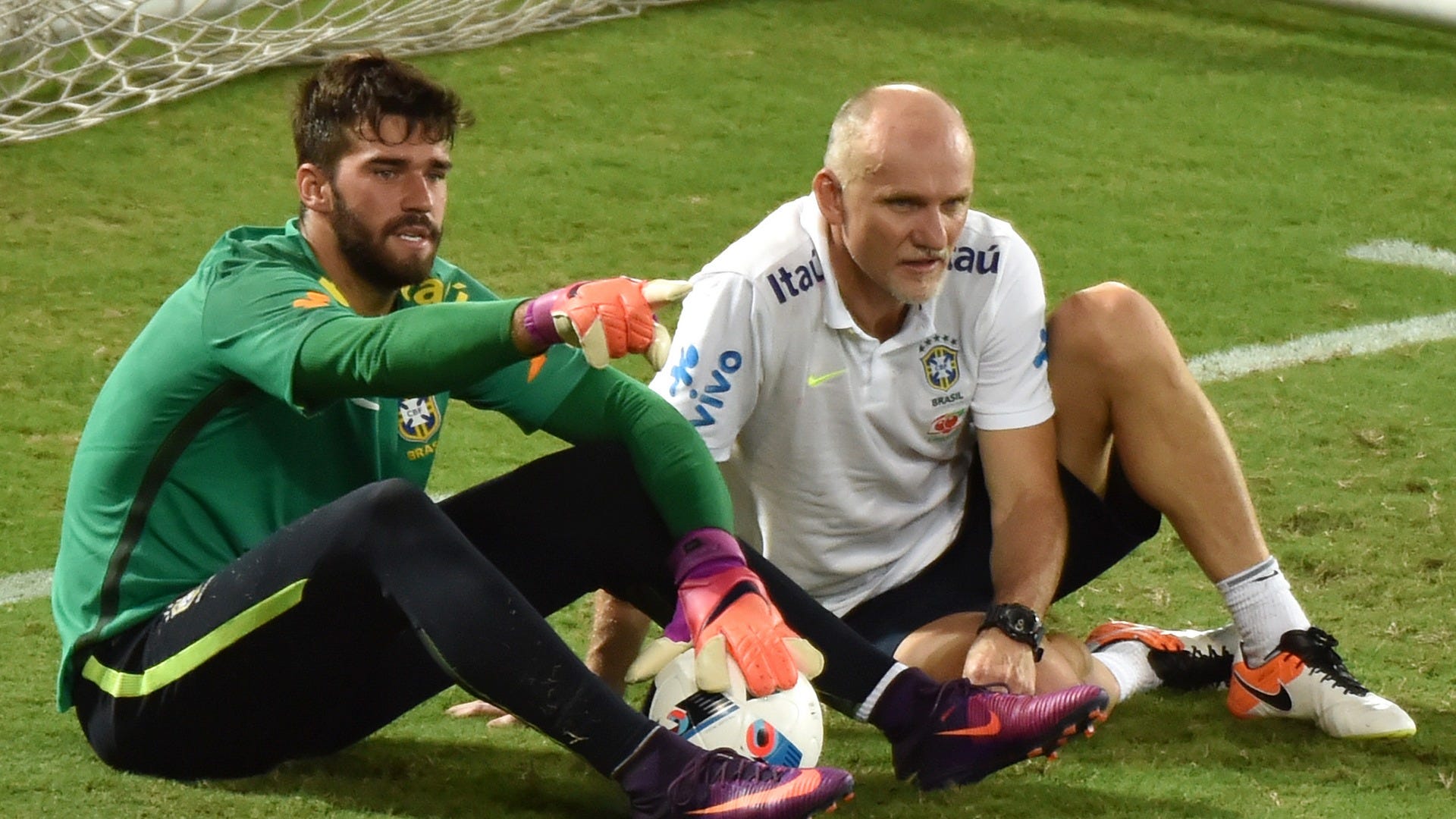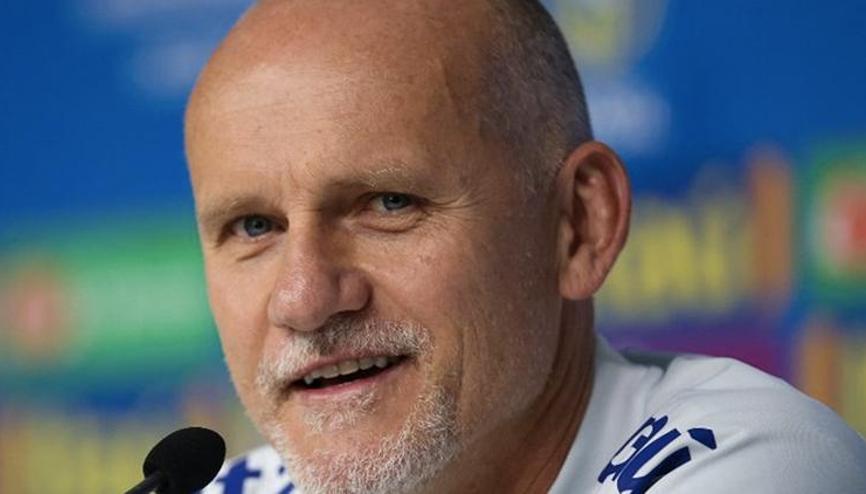Cláudio Taffarel
Cláudio Taffarel

Cláudio André Mergen Taffarel, born on May 8, 1966, is a retired Brazilian footballer who played as a goalkeeper and currently serves as the goalkeeping coach for English Premier League club Liverpool and the Brazil national team. Over his 18-year career, Taffarel played professionally for various clubs in Brazil and Europe.Taffarel commenced his senior career in 1985 with Internacional in Brazil. Throughout his career, he played for five different clubs, including Parma, Reggiana, Atlético Mineiro, and Galatasaray. He concluded his footballing journey in 2003 after a second stint with the Italian team Parma.
Having earned more than 100 caps for Brazil, Taffarel played a crucial role in the national team's triumph at the 1994 World Cup. He also participated in eight other major international tournaments over a decade, notably contributing to Brazil's second-place finish in the 1998 World Cup and securing two Copa América titles in 1989 and 1997. Additionally, he won a silver medal at the 1988 Summer Olympic Games.
Born in Santa Rosa, Rio Grande do Sul, with Italian Brazilian ancestry, Taffarel began his football career with Internacional. During his five-year tenure, he only appeared in 14 Série A games but received the Golden Ball award for the 1988 season.Taffarel moved abroad to join Parma in Italy, a club newly promoted to Serie A. His transfer was influenced by commercial considerations, as Parmalat, the club's owner, aimed to feature the Brazilian goalkeeper in its advertising campaign.
Taffarel became the first non-Italian goalkeeper in Serie A, making appearances in all 34 league games in his first season, helping Parma finish sixth and qualify for the UEFA Cup. He won the Coppa Italia in 1992 and the Cup Winners' Cup in 1993. However, due to regulations limiting non-Italian players in the starting XI, Taffarel faced competition and spent the next two seasons on the bench.
Taffarel moved to Reggiana, becoming the first-choice goalkeeper in the following season, helping the team avoid relegation. He was later dropped from the first team in 1994. After a stint at Atlético Mineiro, he joined Galatasaray in 1998, signing a two-year deal during the 1998 FIFA World Cup in France. At Galatasaray, he won two Süper Lig titles and the 1999–2000 UEFA Cup, where he was named Man of the Match in the final. In 2001, he returned to Parma, featuring as a second-choice goalkeeper but starting in both legs of the 2002 Coppa Italia final, where Parma triumphed over Juventus. Taffarel retired in 2003 after rejecting an offer from Empoli, considering it a sign of God after his car broke down on the way to sign the contract.
Taffarel made his debut for Brazil on July 7, 1988, in the Australia Bicentenary Gold Cup, playing all four games and conceding two goals as his team won the tournament. He was also the goalkeeper in the following year's Copa América, which Brazil also won. Over his ten-year international career, Taffarel appeared in five editions of the Copa América, winning the title for a second time in 1997 and collecting runners-up medals in 1991 and 1995.
During the 1988 Summer Olympics in Seoul, Taffarel won a silver medal, saving three penalties against West Germany in the semi-finals. He saved one penalty in regulation time and two in Brazil's successful shootout. Taffarel also represented Brazil at the 1990 FIFA World Cup in Italy, where Brazil was eliminated in the round of 16 following a 1–0 defeat to rivals and defending champions Argentina. Taffarel conceded only two goals throughout the tournament.
Taffarel was the starting goalkeeper for Brazil during the 1994 FIFA World Cup in the United States. He allowed only one goal in the first round and two in the knockout phases, excluding two penalty kicks in the final shootout victory against Italy. Four years later, in France, he helped Brazil reach a second consecutive World Cup final, which proved to be his final international appearance. However, Brazil lost 3–0 to the hosts. In the run-up to the final, Taffarel notably saved two penalties in the team's 4–2 shootout victory over the Netherlands in the semi-finals. He was also a member of the Brazilian side that finished in third place at the 1998 CONCACAF Gold Cup.
Taffarel played 101 times for the , making him Brazil's most capped goalkeeper of all time and one of the few Brazilian players to have earned at least 100 caps for the national side. Upon his retirement in 2003, coach Carlos Alberto Parreira offered to arrange a farewell match, but the player refused, stating that he was not interested in such fanfare. He did return to play alongside Romário in late 2004 against Mexico to commemorate the 1994 World Cup victory at the Los Angeles Memorial Coliseum./origin-imgresizer.eurosport.com/2013/03/08/967268-19489673-2560-1440.jpg)
Regarded as one of the greatest Brazilian goalkeepers of all time, Taffarel was known for his rational, effective, and generally consistent playing style, favoring efficiency over spectacle. He possessed explosive reflexes, a strong positional sense, and maintained calm composure in goal. Taffarel was particularly known for his penalty-stopping abilities and developed powerful leg muscles from playing beach volleyball in his youth, enabling him to exhibit surprising spring and elevation from a standstill position despite his modest stature. This attribute contributed significantly to his penalty saves./origin-imgresizer.eurosport.com/2010/12/07/668259-21691640-2560-1440.jpg)
Furthermore, Taffarel was quick when coming off his line, and he showcased flair and skill with the ball at his feet, a reflection of his earlier experience as a forward in his youth. However, his lack of height, coupled with occasional struggles in handling and decision-making when dealing with crosses, led to divided critical reception throughout his career.
While he received praise from Brazilian fans and media for his decisive performances with the Brazil national team, earning him the nickname "Saint Taffarel," he faced criticism from Italian pundits over the mental aspect of his game during his time in Serie A. Some considered him unreliable and prone to technical errors despite his shot-stopping ability and generally high-quality gameplay.
Despite these critiques, Taffarel's struggles with nerves may have hindered his consistent success at the highest level with top European clubs. Before the 1998 FIFA World Cup final, some speculated that the goalkeeping position was the "weak link" of an otherwise world-class Brazil national side.
This perception was partly fueled by the lack of top-quality goalkeepers in Brazilian football at the time, and Taffarel was sometimes viewed as one among several keepers of similar standard.
References
- "Cláudio Taffarel: Profile". worldfootball.net. HEIM:SPIEL. Retrieved 10 July 2022.
- ^ "Cláudio Taffarel". Parma FC. Archived from the original on 7 February 2003. Retrieved 19 August 2022.
- a b c d e f g h Franco, Melli (9 July 1998). "Taffarel, la mano di Dio che para i rigori". Il Corriere della Sera (in Italian). p. 43. Archived from the original on 6 October 2014. Retrieved 8 May 2020.
- a b c d e f "Taffarel docet, te lo do' io il portiere brasiliano" [Taffarel docet, I'll give you the Brazilian goalkeeper]. La Repubblica. 20 January 2011. Retrieved 8 May 2020.
- a b c d "TAFFAREL, IN ALTO LE MANI" [Taffarel, Hands Up]. La Repubblica (in Italian). 17 July 1994. Retrieved 8 May 2020.
- ^ Schianchi, Andrea (29 December 2003). "Così prese Taffarel per vendere il latte" [And so he acquired Taffarel to sell milk]. La Gazzetta dello Sport (in Italian). Retrieved 8 May 2020.
- a b Schianchi, Andrea; Cecchini, Massimo; Curino, Luca; Agus, Giampietro; Ghisleni, Sergio; Stella, Silvano (6 July 2001). "Parma, non solo Nakata" [Parma, not only Nakata]. La Gazzetta dello Sport (in Italian). Retrieved 9 May 2020.
- a b c d e f Setyon, Ricardo (1 August 2000). "Claudio Taffarel: "One mistake and I get all the blame"". FIFA. Archived from the original on 28 May 2015. Retrieved 28 November 2017.
- a b c d Eve, James (2 November 2003). "Highway to heaven". The Guardian. Retrieved 6 May 2020.
- ^ Ferrara, Benedetto (4 July 1993). "Stoichkov è libero, un obiettivo Samp" [Stoichkov is free, a Samp target]. La Repubblica (in Italian). Retrieved 8 May 2020.
- ^ "Taffarel imzayı attı". Hürriyet.com.tr (in Turkish). Hürriyet. 25 June 1998. Retrieved 17 January 2022.

















































